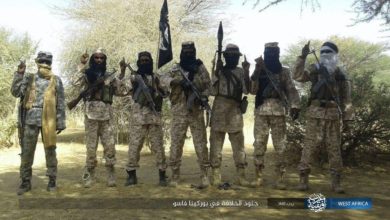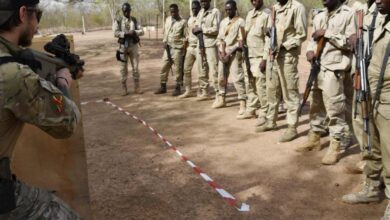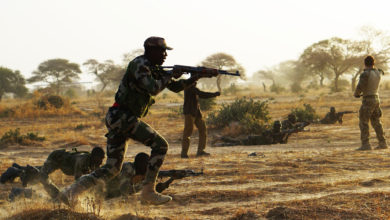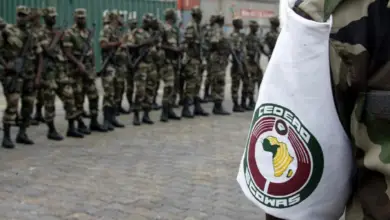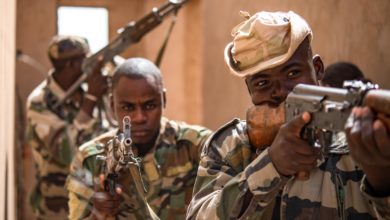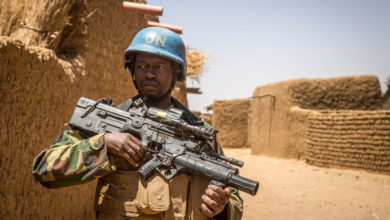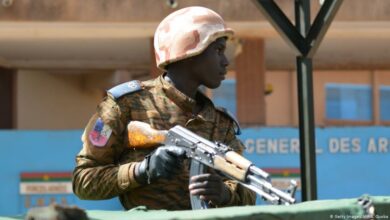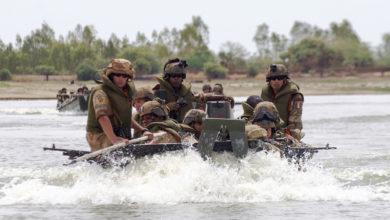Burkina Faso’s parliament on Tuesday, January 21 unanimously adopted a law allowing for the recruitment of Volunteers for the Defence of the Fatherland (VDP) – local volunteers who will act as auxiliaries in the fight against militants.
Parliament approved the new law as the government said a “terrorist group” killed 32 civilians in Nagraogo village and four more people in Alamou village in Sanmatenga province in the Centre-Nord Region the previous day.
Faced with these “repeated attacks” against civilians, the government launched an appeal for the people’s “frank collaboration” with the defence and security forces.
Burkina Faso’s badly equipped, poorly trained and underfunded security forces have been unable to stem growing violence, which surged throughout 2019. According to a BBC analysis of data from the Armed Conflict Location & Event Data Project (ACLED), there were almost 1,900 reported fatalities due armed violence in the country in 2019. Of those, 859 deaths were attributed to Islamist groups. Other analyses put the toll even higher.
Burkina Faso: reported fatalities
– Casualties increased more than sevenfold between 2018 & 2019, surpassing the death toll in Mali.
– Sahel region concentrated close to 80% of all casualties in 2019.
– Fatalities in Est region increased more than fivefold between 2018 & 2019. pic.twitter.com/Vb3UmyTgi5— José Luengo-Cabrera (@J_LuengoCabrera) January 14, 2020
Volunteers for the Defence of the Fatherland
Acknowledging that Burkina Faso’s Defence and Security Forces (FDS) were “understaffed, given the nature of the threat,” Defence Minister Chériff Sy told parliament that the volunteers “will participate in meeting the challenges of the moment,” Le Faso reported.
He said the VDP volunteers would be auxiliaries under military control, and their recruitment would enable the FDS to conduct other operations.
The volunteers’ mission is to contribute to the protection of people and property in their village or locality, Infowakat reported.
According to a document seen by AFP, volunteers aged over 18 will be recruited in agreement with local populations.
They will receive 14 days training in human rights, discipline and weapons, after which they will be given small arms and communications equipment.
The recruits will be expected to conduct surveillance and provide information and protection for their local communities in the event of an attack while waiting for security forces to deploy, the minister said.
“It is not a question of making cannon fodder out of them,” Sy said, adding that the government wanted to make sure the volunteers did not become militias.
But the VDP volunteers will be prohibited from carrying out police investigations or “missions to maintain law and order,” Infowakat reported.
No date has been set for the start of VDP recruitment and training.

Intensifying violence in the Sahel
One of the poorest countries in the world, former French colony Burkina Faso lies in the heart of Africa’s sprawling, impoverished Sahel, on the southern rim of the Sahara desert.
The country has been battling an escalating wave of attacks over the last three years, beginning in the North Region near the border with Mali. Attacks have spread to the East Region, near the border with Togo, Benin and Niger, and to a lesser extent, the west of the country.
United Nations Secretary General Antonio Guterres said in November that he was “deeply concerned about the spiralling violence in the Sahel, which has spread to coastal States of West Africa, along the Gulf of Guinea.” He had warned in July of a potential expansion of the insurgency to Ghana, Benin, Togo, and Cote d’Ivoire.
Many armed groups including Islamic State are active in the Sahel region, but the majority of attacks are attributed to JNIM, which formed in March 2017 from a merger of several smaller groups. JNIM’s leadership has pledged allegiance to al-Qaeda leader Ayman al-Zawahiri.
Since May 2019, ISIS has attributed insurgent activities in the Sahel area to ISWAP, its West Africa Province affiliate that split from Boko Haram in 2016, rather than to Islamic State in the Greater Sahara. ISWAP’s main area of operations is the Lake Chad area of Nigeria, Niger, Chad and Cameroon.
Burkina Faso also faces a local militant Islamist group, Ansar ul Islam, which emerged near the Mali border in December 2016.
The complex insurgency in the Sahel began in Mali in 2012, when a Tuareg separatist uprising was exploited by al-Qaeda-linked extremists who took key cities in the desert north. Former colonial power France began its Operation Serval military intervention the following year, driving the jihadists from the towns.
But the militant groups morphed into more nimble formations operating in rural areas, and the insurgency gradually spread to central and southern regions of Mali and across the borders into neighboring Burkina Faso and Niger.
According to the U.N., around 4,000 people were killed in militant attacks in the three countries last year.
Serval evolved in August 2014 into Operation Barkhane, with a mandate for counter-terrorism operations across the Sahel. Roughly 4,500 French troops are deployed, focusing activity in insurgent-hit Mali, Niger and Burkina Faso. Troops deployed to Barkhane work alongside local forces and other international operations in the Sahel, including the regional G5 Sahel Joint Force (FCG5S), which comprises troops from Burkina Faso, Mali, Niger, Chad and Mauritania, and MINUSMA, the United Nations stabilization mission in Mali.
The French defense ministry said on January 16 that more than 1,000 troops from Mali, Burkina Faso and Niger, the FCG5S and Barkhane had conducted a joint operation since January 2.
Last week, France’s President Emmanuel Macron and the leaders of the G5 Sahel states announced a new Coalition for the Sahel which will see increased coordination between French and local forces focused on the Mali-Burkina Faso-Niger tri-border zone and targeting Islamic State as a priority. The new Sahel Coalition will see Barkhane and the FCG5S forces operating under joint command.
Macron also announced that 220 more troops would sent to the Sahel to reinforce Barkhane.
Macron said the Sahel Coalition would prioritize the fight against ISIS in the tri-border area because it is the most dangerous.
Barkhane already has an international dimension, with France’s European partners contributing troops and equipment. Denmark deployed two Merlin helicopters that became operational in late December and Estonia is to almost double the size of its Barkhane contingent this year. Chinook helicopters from the United Kingdom also support the operation.
France has for months been trying to build support for a new international task force called “Takuba.” Armed Forces Minister Florence Parly said in November that France expected the new force to deploy in Mali by 2020.
Estonia was the first partner to confirm a special operations forces deployment to Takuba. A defense ministry spokesperson told The Defense Post that special forces will deploy to Mali in the second half of 2020 and that force will “assist, advise and accompany” the Malian Armed Forces. Belgium and the Czech Republic have also signaled that they will participate, but the U.S. and Germany have declined.
With reporting from AFP


